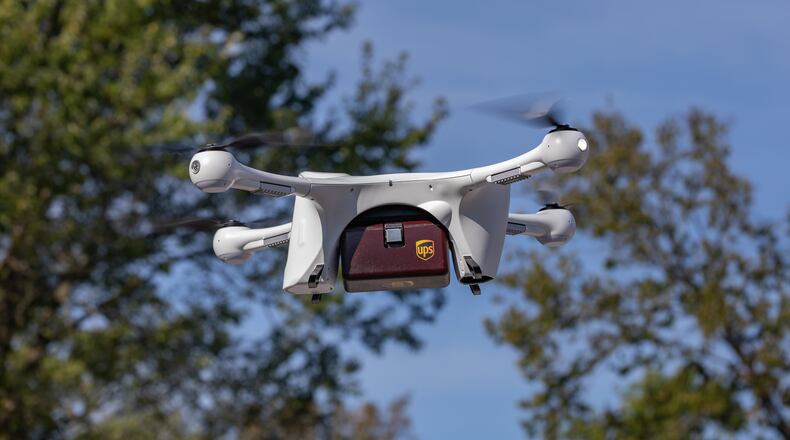The Federal Aviation Administration on Tuesday announced it had granted UPS approval to operate a fleet of drones, allowing it to dramatically expand its unmanned delivery operations.
The Sandy Springs-based shipping giant said it is the first time federal regulators have issued such a broad certification. It will permit the company's drone subsidiary, UPS Flight Forward, to operate what it calls a "drone airline" on hospitals and other campuses. Eventually, it wants to transport other items for businesses.
The move comes amid fierce competition in the shipping business to meet soaring demand.
Doorstep drone deliveries are still years away. But in campus environments, the certificate places no limits on the size or scope of UPS Flight Forward allowing it to fly an unlimited number of drones controlled by an unlimited number of operators, UPS said. The FAA certificate allows UPS Flight Forward to operate drones beyond line of sight, at night and weighing over 55 pounds. It will still need to get exemptions approved by the FAA for certain uses and trials.
UPS also plans early next year to choose a state for the headquarters and first operations control center for UPS Flight Forward. With the corporate headquarters of UPS in metro Atlanta, the state of Georgia is in the running for UPS Flight Forward, said UPS chief strategy and transformation officer Scott Price.
Still, Georgia will “have to compete with the other states,” Price said. He said the search would look at more than just incentives, but also the regulatory environment, the pool of educated workers and training available.
While the FAA has already authorized specific, limited use of small drones for commercial purposes for Google sister company Wing Aviation and Amazon Air, UPS has said the Part 135 certificate is broader.
For UPS, “there’s always an advantage to being first” to gain experience and knowledge of how to operate effectively, said Nicole France, vice president and principal analyst at Constellation Research. There will be competition between UPS and others, particularly Amazon, but the companies seem to be taking different approaches, she said.
“For Amazon, it’s delivering stuff to consumers by and large,” France said. “For UPS, they have a slightly broader view of what that customer base will be and what context.” By starting out on very urgent and critical deliveries in healthcare, UPS is focusing on areas of greatest need where traditional delivery may not be effective or fast enough, she said. “I think that’s clearly just the start.”
Credit: Powie/Pixabay
Credit: Powie/Pixabay
The FAA said UPS demonstrated through data, documentation and test flights that its operations met safety requirements for an air carrier certificate.
“This is a big step forward in safely integrating unmanned aircraft systems into our airspace,” said U.S. Secretary of Transportation Elaine Chao in a written statement.
UPS earlier this year began using drones to deliver medical samples across a WakeMed hospital campus in Raleigh, N.C., and plans to expand the service.
Such samples usually have to be transported by bike or motorcycle or vehicle, but “we can now do it in 3 minutes with a drone,” Price said.
Looking at the pool of potential customers for the drone service, “there’s literally hundreds of campuses across the United States that are hospitals,” as well as corporate campuses, college campuses and other education campuses, Price said.
UPS has been testing drones for several years, including conducting drone deliveries of vaccines in Rwanda, testing a drone delivery to an island near Beverly, Mass., and testing delivery by a drone deployed from one of its brown trucks.
Price called the company’s plans “an important pivot point of the reality check that has to occur for people to be able to get deliveries [by drone] to their home at some point,” which he said UPS sees as an opportunity once the FAA issues rules for such operations in late 2021.
“There are so many rural communities where a driver has to go 2 miles down a driveway,” Price said. Using a drone “can make the driver so much more efficient.”
But there are also still many regulations to be sorted out for deliveries in urban and suburban areas in particular, Price said.
He said drones will not decrease the need for UPS drivers, and that drones would augment drivers’ jobs, not replace them. “We see the opportunity to continue to grow” for a decade, he said.
About the Author
The Latest
Featured




